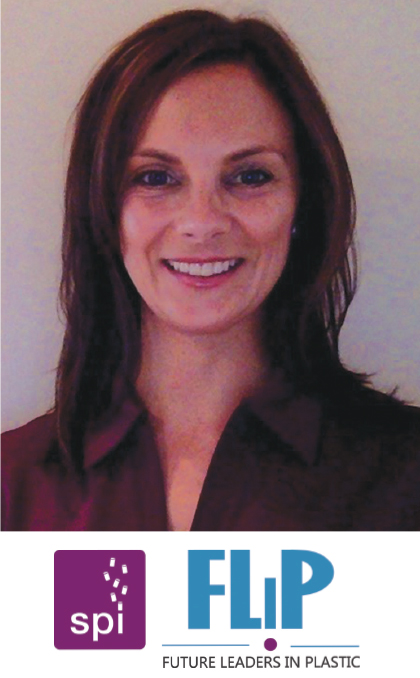The FLiP Files: Annina Donaldson
Previous Article Next Article
The FLiP Files: Annina Donaldson
Previous Article Next Article
The FLiP Files: Annina Donaldson
Previous Article Next Article

The FLiP Files is a blog series spotlighting young professionals who are active in SPI’s Future Leaders in Plastics (FLiP), a group for plastics professionals under the age of 40. For our fifth entry, we spoke with Annina Donaldson.
Where do you work and what’s your title?
I’m president of Florida operations for Maxi-Blast Inc. I’m also vice chair of SPI’s FLiP program.
Tell us a little about what your company does.
Maxi-Blast is a full-service supplier of plastic blast media [plastic materials that are blasted at industrial equipment and other surfaces to clean them] and blast cabinets [large containers in which this type of cleaning is conducted]. We manufacture non-abrasive plastic blast media used for various applications, including (but not limited to) plastics and rubber deflashing, mold and die cleaning, paint stripping, cryogenic deflashing, and extrusion screw cleaning. We’re the alternative to chemical and by-hand cleaning. The cabinets we manufacture are tailored to specific applications, such as our patented mobile-screw cleaning cabinet for large feed screws. We carry a stock of spare parts and provide services such as setup or troubleshooting for our cabinets.
How did you find yourself working in the plastics industry?
I grew up in the plastics industry. My father started the business in 1979. Growing up, my siblings and I would visit him and ask to shred paper in the office or sweep the shop floor. In high school, I would do random projects filling sample bags or separating plastic. After graduate school and testing out other careers, my father asked me to interview for a full-time job working alongside him. That was 10 years ago.
Has anyone in the industry mentored you?
Two people actually — Gail Barker and my father, Robert Donaldson. All my life, I have watched my father striving to maintain his work ethic and grow his knowledge of the industry. Working alongside him is a daily mentorship program. Gail, however, was the first person to really take me under her wing. Gail was president of Maxi-Blast when I started in January 2006, and there were even fewer women in the industry then than there are today. Every day she gave me some piece of advice about leadership, being a woman in a male-dominated industry or how to manage working with family. Gail passed away in December 2006 but the year she mentored me was, and is still, the most invaluable of my career.
Describe in one sentence what you do on an average day.
Whatever is involved with achieving the goal of making sure the factory is running smoothly, that we are making the best possible pellet on the market, and handling the day-to-day operations of a business.
What do you like most about working in the plastics industry?
That I learn something new about our industry every time I go to a trade show or on a plant tour. I am in awe of how many different ways plastics are made or used. The industry is ever changing and reinventing itself, and I look forward to seeing what will be done next.
What’s one thing about your personal life that you feel has been changed by having a career in plastics?
Choosing to work in the plastics industry meant working with family, thus blurring the line between personal and work life. Without the plastics industry, I wouldn’t have the chance to share a passion for a business that means so much to everyone in the family. Dinner conversations would be much different, and I wouldn’t get to see as much of my family as I do now.
What are the major challenges you see facing the plastics industry today? How do you think the industry can overcome them?
Getting the younger generations excited about a career in plastics manufacturing, and the misconceptions about plastics. As long as companies keep showcasing what they do and opening their doors, there is a greater chance that a millennial will be there and say, “Wow, this is for me!”
As for the misconceptions, it’s necessary to share facts with those who are not in the industry, and making sure government officials are educated before they vote on laws effecting plastics companies. It’s definitely a “the more you know” solution.
Why do you think someone from your generation should consider a career in plastics?
It’s important to want to go to work everyday. A career in plastics can be lifelong and meaningful. This industry is exciting, full of potential and growing. There is also a sense of pride when you work for a company that manufactures a tangible product that you just can’t get in other industries.
What’s one plastic product you couldn’t live without?
My American Express card.